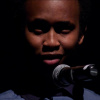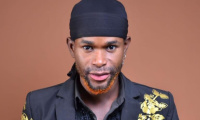Interview: Bongeziwe Mabandla
Bongeziwe Mabandla released his latest album Mangaliso in May this year. Combining traditional motifs and electronica, the album has gotten a lukewarm reception from the artist’s supposedly dedicated fan base. This, however, could a blessing in disguise: the new music could now be speaking to an untapped audience unbeknownst to the artist and if we visit the lessons modern music history has taught us, it could be a classic in the making with a few more plays needed before fans get it.
 Bongeziwe Mabandla will perform at the Lyric Theatre on Friday 29 September.
Bongeziwe Mabandla will perform at the Lyric Theatre on Friday 29 September.
Mabandla will be playing songs from Mangaliso at the Lyric Theatre in Johannesburg this Friday and he says that if fans want to get a taste of the real emotion behind the music, they should make an effort to be there. The SAMA-nominated guitarist and singer has played in Australia, Canada, Germany and Reunion Island, and is currently gearing up for a performance at South Africa’s favourite bush festival Oppikoppi early next month.
Mabandla spoke to Music In Africa about what it means to fuse traditional and urban sounds to create a new identity. He also admitted to stage fright when performing back home.
You’re a trained actor. What made you decide to get into music?
My background is very much in theatre. I came to Johannesburg to be an actor. I was serious about theatre and interpreting characters. But then when I finally got here the desire to be an actor died down, the training I was getting wasn’t adequate, I had high expectations of AFDA [film school] but the training wasn’t as intense as I thought it would be.
What influenced you music and was this the artistic path you always wanted to take?
I was influenced by musicians. When I started I wanted to emulate Jabu Khanyile, Oliver Mtukudzi, Simphiwe Dana, Thandiswa Mazwai, Vusi Mahlasela. This is the place that I wanted to draw from. I was driven by the ideology of black consciousness. I felt it was important as a black child to find my identity in the music that comes from people who are like me.
A lot of you music is in Xhosa. How much of you Xhosa upbringing has had an influence on your music?
The cultural element only manifested later. I went to English school and it wasn’t until later that I actually started learning Xhosa. I speak English a lot. The shift came in when I was doing art history in high school. I asked myself where all the black contributors of art were. When I began learning about the contributions that black South Africans had made, I went on a quest to find myself and my culture and to learn more about the contributions people of my culture had made. I was excited, and being an artist I also wanted to start contributing in a way that reflected my culture, and that contribution can be found in my music.
What is it like performing for audiences in South African where people understand the language you sing in versus an audience in Germany, for example, that doesn’t?
I was performing in the Eastern Cape and somebody complained that I had been doing the same material all the time even though I had not performed there much. I get nervous when I have to perform in the Eastern Cape. In a lot of places I know I can get away with using the wrong pronunciation, especially overseas.
When I’m performing for a home crowd I feel more pressure because my songs are subject to more scrutiny – they understand that the music is for them. I enjoy performing both home and away. In countries that are outside South Africa, I feel like they connect with the kind of music I do. They understand the storytelling and the minimalism in the music like when I do acoustic shows.
What was it like receiving two SAMA nominations for your album Umlilo in 2013?
That was a bittersweet moment. I wasn’t sure that I was going to get nominated. My record label told me I had to go to the nomination ceremony. I was nervous, all these people I grew up watching were there like Mafikizolo. People started telling me I had to get ready to win. The mistake I made when I got into the hype of the awards is that I didn’t take time to think about the fact that I might not win. So I took it hard when I didn’t get an award. On the bright side, the nominations opened many doors for me.
How has it been transitioning between traditional and electronic music?
I realised that this album [Mangaliso] was a risk. Some of my fans weren’t happy. It was hard for some fans to transition with me because of the expectations they had from my previous work. But working on some electro sounds is growth. I wanted to experiment, I had fun in studio and I wasn’t boxed in when it came to the creation of the music. But it was a hard thing to do.
What makes your music different and more relatable than the next artist’s?
My music comes from a place that I don’t understand myself when I’m in studio. The music comes from a place that is natural, open and honest, and that's what I enjoy about the content of my work. I don’t make music fast. That is what makes my music exciting.
What can fans expect from your performance at the Lyric Theatre on Friday?
When you perform live you capture all these little things that are not in the recording; the reality of the voice and how the audience interacts with it gives an authenticity to the music. The audience also gets to see the humanness of an artist – that is what I hope the audience will feel and see at the Lyric Theatre.















Commentaires
s'identifier or register to post comments